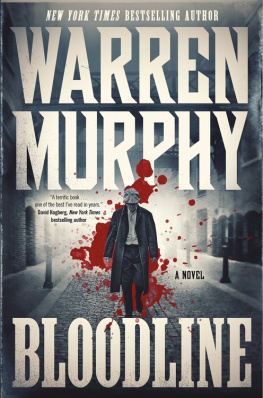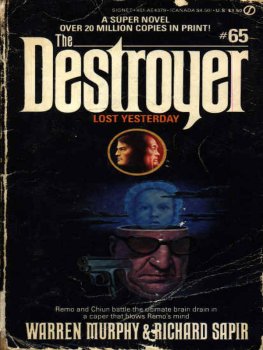Destroyer 72: Sole Survivor
By Warren Murphy and Richard Sapir
Chapter 1
The world was astounded when the first Soviet space shuttle blasted off into orbit.
Everyone knew that the Russians had been working on a shuttle of their own. But no one expected it to get off the ground. The Russians had finally licked the problem of cryogenic propulsion, but they couldn't come up with a reusable rocket motor. They tried to steal the secret from the French Ariane space program, but failed.
And so they resorted to the tactic that had enabled them to get Sputnik into orbit. They didn't build a better propulsion system, they built a bigger one. They mounted their main rocket engines onto the fat external fuel tank, strapped the shuttle to it, and augmented the system with four slender solid rocket boosters. The U.S. shuttle had used only two.
Once again, the Russians had solved a problem through brute force when patience and skill would have been more efficient.
In the Sputnik days, so long ago, they blew up rockets every third day until the law of averages ran in their favor and their tiny satellite achieved orbit. In the days of manned space flight, Russian cosmonauts lost their lives on the launching pad or in space, one for every five successful American man-in-space projects.
Thus, when the first Russian shuttle made it into space on the first try, the world was astonished.
"Amazing," said the President of the United States. "It didn't blow up."
"It isn't down yet, Mr. President," the Secretary of Defense replied. "They got it up there, but they haven't got it back in one piece. Not yet."
They were in the Situation Room in the White House basement. The walls were covered with giant computer simulation displays, which fed off a bank of manned consoles that received instantaneous data from orbiting satellites. The President had SINCNORAD on the line. The head of NORAD's Space Defense Operations Tracking Center was explaining over the phone link that the launch was half expected.
"The Soviets have always operated this way," the general said. "Every time we announce something new, they break their necks to beat us to the punch. When we announced our first satellite program in the fifties, they sent up Sputnik. When we started shooting monkeys into orbit, they sent Gagarin up there. When we put our first man into space, they sent up the first woman. Now that we're about to resume our shuttle program, they do this to upstage us. Typical Russian thinking."
"But we beat them to the moon, right?" the President said. "We won that one."
"Yes, sir. Twenty years ago," the NORAD general said. "Times have changed. The Russians are beating the pants off of us in space."
"What is it doing up there?"
"Just orbiting so far," said the general. "But you can bet they're going to deploy a payload. The Soviets may be grandstanders, but they aren't doing this just for the show."
"I just want to know one thing," the President demanded. "Is their shuttle better than ours or not? I have to face the American people with this."
"It depends on how you look at it, sir."
"Look at it straight on, without blinking," the President said. "That usually works for me."
"Their new Energia booster system is clumsy. Too many boosters. Dangerous to launch. They should have waited. A few more years and they could have had reusable rocket motors attached to the shuttle itself. Instead, they have to jettison their motors when they ditch their external tank. Not cost-effective."
"It's a turkey, then?"
"Not exactly, sir. Their design is a carbon copy of ours. In place of the rocket motors, they've installed ordinary jet engines. They're smaller than rocket motors and that gives them a bigger payload bay. But the important thing is that the jet engines enable their shuttle to make a powered landing. It can land anywhere a 747 can. That's a major plus."
"I don't understand. Why doesn't our shuttle have that capability? We have jet engines too."
"Budget restrictions," answered the NORAD general.
"That I understand," said the President, who had just spent the morning arguing with the Speaker of the House over the mounting national debt. "Your intelligence sources are to be commended."
"Thank you, Mr. President," said the general, neglecting to mention that he'd gotten everything out of his office file of Aviation Week.
The President replaced the phone. Over the loudspeaker system of the Situation Room, the intercepted communications from the Soviet shuttle crew were reproduced. Listening to the two-way chatter, the President wished he knew conversational Russian. An NSA stenographer was rapidly transcribing the communications into translated English on a shorthand machine. The President looked at the unreeling strip of paper blankly. He didn't read shorthand either.
"They're up to something up there," the President told the Secretary of Defense grimly.
"They're also in trouble," the Secretary of Defense, who did know shorthand, said suddenly.
At first Mission Commander Alexei Petrov did not think the spinning object was a threat.
He sat at the controls of the first Soviet space shuttle, commissioned the Yuri Gagarin in honor of the first man in space, and watched the metallic object through the big vacuum-insulated cabin windows.
The object appeared to be a meteorite on a collision course with earth. It was small and misshapen, not much larger than a toaster. Commander Petrov was not concerned about the possibility of colliding with the meteorite. In the vastness of space, meteorites were no more a threat than they were on earth. A hit was possible, but the odds of such a freak accident happening were about the same as being struck by lightning during a rainstorm.
Commander Petrov's attention was drawn to the object because it moved more slowly than a meteorite being drawn into the earth's gravitational field should. Much too slowly.
"Look there," he told his copilot, cosmonaut Oleg Gleb.
Gleb followed Petrov's pointing finger. "I see it," he said excitedly. Gleb was the mission's exobiologist, which meant that he was schooled in the subject of life beyond the earth. Inasmuch as life beyond the earth had not so far been discovered, Gleb's specialty was only a little more practical than psychiatry. "But what is it?" he asked.
"I do not know," answered Petrov, "but it now appears to be spinning in our direction."
"Yes. I agree. It has charged direction toward us. What do we do?"
"Request orders."
"But it will be upon us before the chain of command can issue an informed decision."
"Then my hand will accidentally trip the maneuvering thrusters while you communicate with Star City." Suiting action to words, Commander Alexei Petrov pressed the control yoke with both hands. Thruster jets sent the shuttle tipping away from the approaching object, which resembled a clump of fused nickels. "Yuri Gagarin to Cosmograd. Acknowledge please, Star City," said Cosmonaut Gleb as he watched, with widening eyes, the strange spinning object appear to change course again. "We have an unidentified object closing on us. Orders, please."
"Describe object," demanded ground control.
"Not a satellite, not a meteor, not otherwise identifiable," sputtered Cosmonaut Gleb as the object reversed its spinning motion as if locking in on them. It continued to close.
"Be more specific," said ground control in that infuriatingly steady monotone. Don't those fools realize that we might possibly be under attack? thought Gleb.
Mission Commander Alexei Petrov jumped into the conversation.
"I am taking evasive action, but the object continues to follow us. What do we do?"
"Do not take evasive action without orders," Cosmograd insisted. Then the voice went away, obviously to confer with higher authorities. In Russia, there were always higher authorities and no one courageous enough to make a decision in a crunch.
Next page



